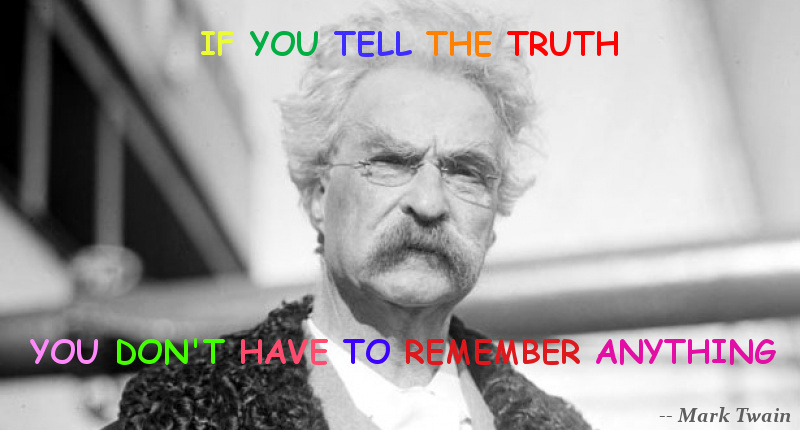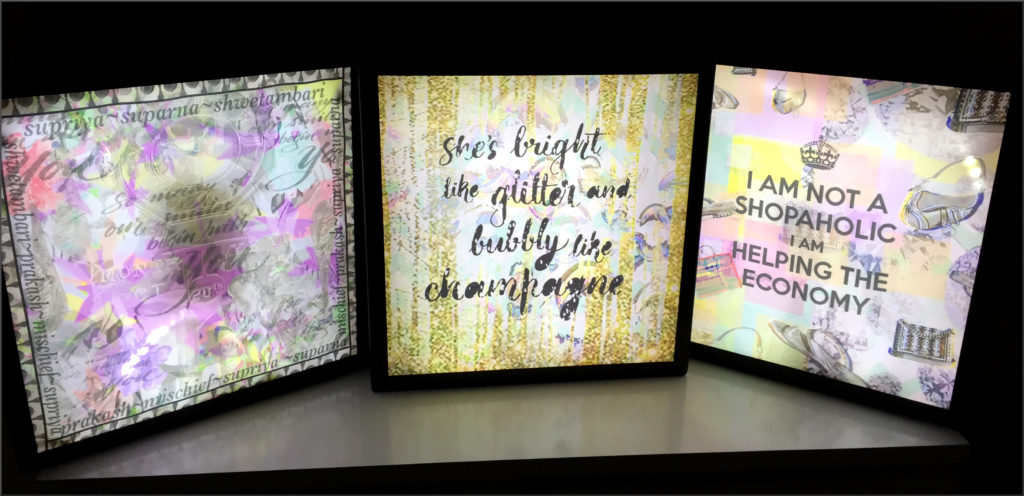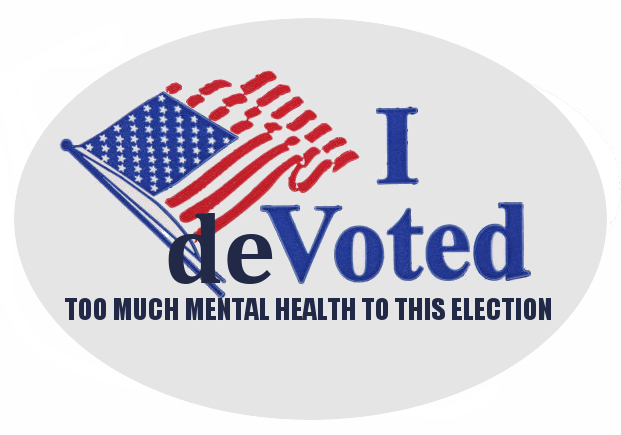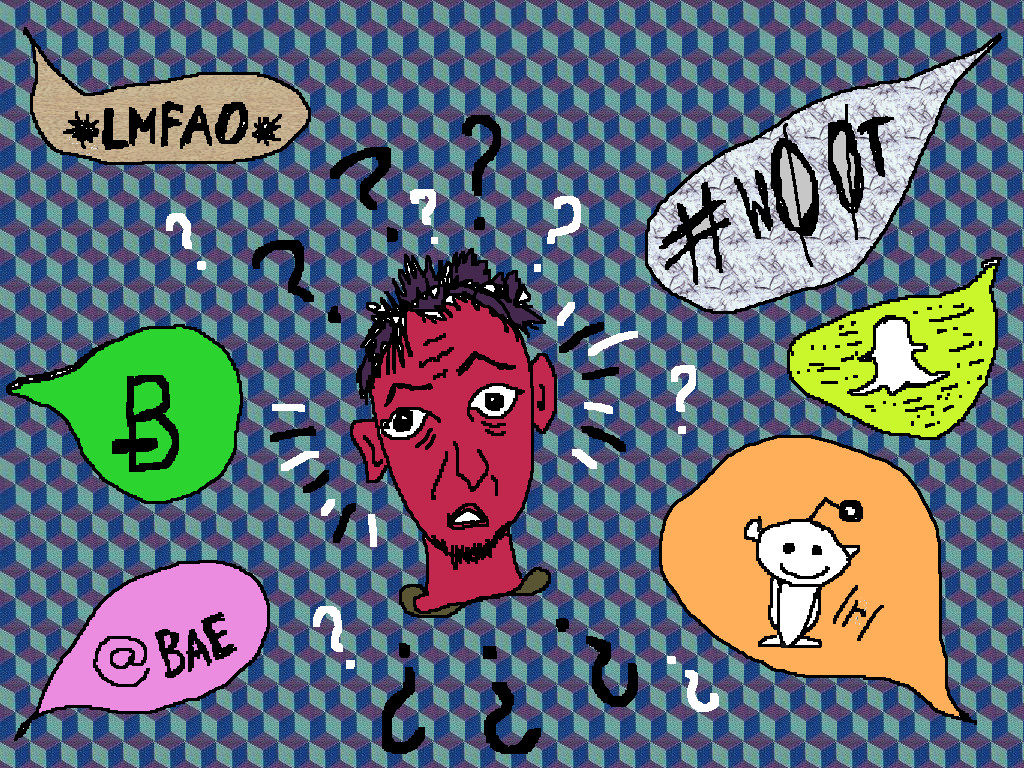“Make America Great Again”, eh?
Sure, it is tempting to yearn for the good old days. Most of us do it when we feel dissatisfied with the present or anxious about the future, especially as we age and the grass seems wilted and rotten in the “here and now” and crisp and glossy on the other side of the time-space continuum fence.
It is only human nature to revise and embellish the past to fit our wishful thinking. But there exists a treacherous slippery slope, when people actually start believing those rosy dreams of the wondrously charmed past and let those delusions reflect too negatively on their perception of the present. You hear people “reminiscing” about times before they were even born, convinced that those were the best years — especially compared to the shitshow of modern realities.
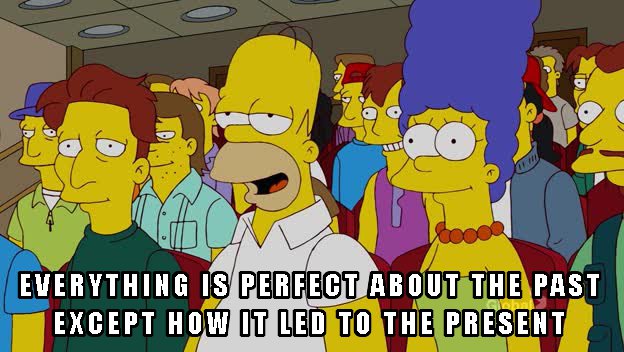
Watching TV reruns and hearing our politicians and media peons proclaim the end of morality, this nebulous “back then” comes off as a simpler and a fairer place. “Back in the day”, everyone was doing great-o: families stayed together, small businesses thrived, lawyers were honest, bankers were generous, the police were friendly and young people were just so gosh darn polite.
“Not like today”, we gripe to ourselves, “Not like this bleak, dickful world I must occupy, a victim of cruel timing!! I belong in an era when everyone knew how to work, how to love, how to live! But certainly not in this cesspool of weak, ignorant, apathetic morons!!!”
Well, my friend, you might want to start drinking or toking to loosen yourself up, cause these loathsome nincompoop contemporaries of yours are actually as good as it gets! And so is the theater of the absurd we call modern life. As hard as it is to believe, the world, in all its supreme crappiness, has never been safer or gentler. Not because the now is great but because the before was even more obnoxious. Let’s walk through the five most frequent laments for the “good old days” heard from your garden-variety crabby citizen — and debunk them for the fairy tales they are.
MYTH #5: TODAY’S WORLD IS SO VIOLENT – WOULDN’T IT BE GREAT TO GET BACK TO THE MORE PEACEFUL TIME IN OUR PAST?
Most of us are horrified by the onslaught of narratives, images and sounds of violence piping out of everywhere. It feels like the world is unraveling with gratuitous brutality and is about to reach a critical mass of FUBAR-ness that will result in “Michael-Bay-and-James-Cameron-had-a-baby” level of planetary wipe-out. In times like this, it is instructive to remember that our species’ rap sheet is actually improving.
It is a relief, of sorts, to know that our century does not hold a monopoly on human cruelty: people have been joyfully offing each other for thousands of years with impressive creativity and gusto. Despite emerging science making mass annihilation more possible than ever, we actually do less physical damage to each other today than in past eras.[1] The modern unprecedented advancement in information technology makes conflict and injustice more visible rather than more prevalent.
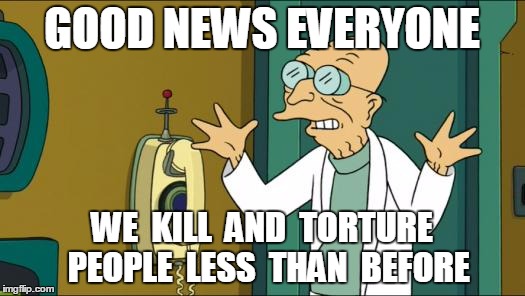
It is increasingly easy to feel like the walls are caving in and the sky is falling but let’s not overlook the silver lining on the noxious crudplatter that is our modern life. At the very least, we have reached a level of civilization when we can begin to theoretically conceive of a fair, just, safe society. We have laws for complex notions such as “privacy”; we have words like “ethics” and “inhumane” at our disposal to use in public debates on topics such as “Is it wrong to torture?”
Those public conversations did not exist before! The civil rights of “bad guys” have not always drawn so much interest and empathy from the general public, you know 🙂 And “the unwashed masses” were not always invited to participate in discussions or decisions of any real importance.
The bottom line is: for most of human history, you really had to be a one-percenter to feel secure from being driven off the land, maraudered, enslaved and violated. Everyone else was in a tight race for survival, vulnerable to exploitation and oppression. The power elite got to live it up until they were “accidentally” poisoned by their own kin or casually dumped to rot away in a dungeon. And, occasionally, the rabble would throw down a revolution and behead everyone rich and fancy. So, no one was safe, really.

Clearly, humans are still a very aggressive species, but today, some of our violent nature is seeped by “wars” we wage on the virtual battlefields. Instead of hitting each other with sticks and rocks, people express their anger and fear by furiously typing out profanities on anonymous discussion boards, bullying peers or stalking love interests’ social media accounts. Instead of going outside and picking a fight with a rando, intoxicated tough guys have to option to log on to Facebook and rip into some poor bastard who committed the ultimate treachery of not fact-checking their memes before posting. “I don’t care that you raised me, Grandma, you’re a fucking liberal fascist scum for “liking” O’Bummer’s speech! Gawd, how do these douchebags survive getting out of bed?”
So, perhaps we are just as violent in our minds, but not as much in our deeds. Online trolling is the lazy and / or cowardly person’s bar brawl. As luck would have it, there are many, many lazy cowards out there.

MYTH #4: BACK IN THE DAY, PEOPLE TREATED EACH OTHER WITH RESPECT
No one will insist that today’s world is a glowing bastion of mutual respect and simple dignity. But to suggest that it was any better in the olden days is to erase all the blood and human tragedy of the hellish struggles for civil rights and basic life necessities denied to the majority of the world’s population by the very few in power.
In the United States, unless you are a white male of the upper class, you have no reason to long for the status quo of yore because all those old-fashioned courtesies the “yore” is so fondly remembered for would not have been available to you. But even if you are a wealthy Caucasian male, wishing for those days reflects quite poorly on your character. Are you suggesting you actually want to go back to the days of legal slavery, overt misogyny, religious morality police, child labor, etc.?
Because that’s a pretty damning thing to admit to wishing for. When you say that people aren’t respectful like they used to be, what you really mean is that you’re not being given “due” reverence as the undisputed master of the planet and every living thing in it, solely on the basis of the imaginary formula: low melanin + Y chromosome = *winning!*. The fact that your entitled ass doesn’t get automatic, unearned respect anymore is a heartening sign that the world is getting better, not worse.
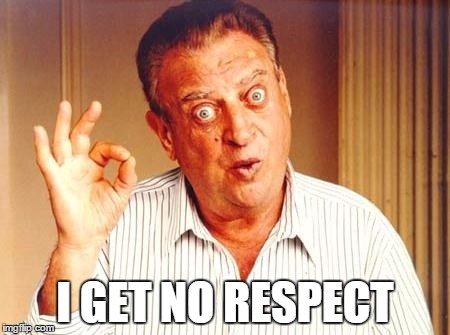
Maybe don’t be insufferable?
MYTH #3: KIDS TODAY ARE UNEDUCATED, MANNERLESS, ANTI-SOCIAL IMBECILES
This should be common knowledge, but let’s repeat it anyway, for the older crowd, god bless them: there has never been a single cohort of aging adults that did not consider the young people of their day to be the sure sign of the impending apocalypse! Those arrogant, crusty little blah blah blah blah *trail off* “This was, surely, not at all the case when I was a child – we were all thoughtful, well-behaved youngsters who worshiped and obeyed our parents.”
Of course you were, Dearie. You also always did the right thing and said all your prayers, so it’s shocking that God would punish you with these (check the rant that applies to your generation):
___ arrogant, defiant, oversexed, drugged up, barely literate little shits
___ pathetic, anti-social, vanilla pansy-ass, attention-deficient, barely literate little shits
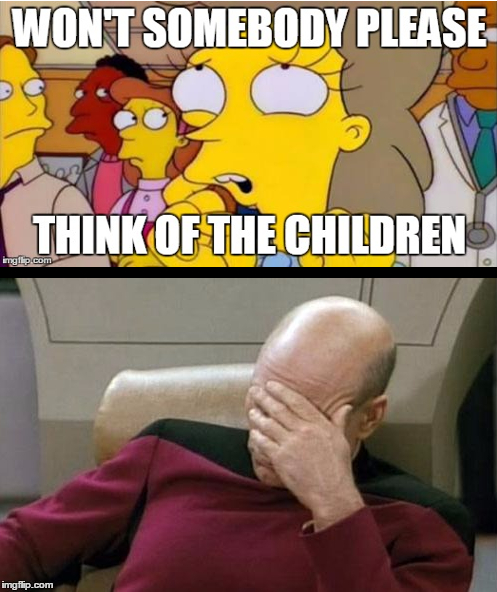
The irony of ragging on their own spawn for being doomed, incompetent idiots seems to be wasted on parents who, after all, popped out and raised those funky creatures. And who, pray tell, came up with all that technology that you claim is sapping their brains and social skills? Stop blaming the inventions of the brilliant and/or evil minds of your own contemporaries on your unsuspecting offspring, people!
And while we are at it, let’s back off on holding them responsible for all the ills of the universe. Remember, you once inherited this turd of a world from your own parents! So, it seems hypocritical and mean to gloat to the next generation, like: “Ewww, you’re holding a turd! Way to catch a turd, dumbass!” Like you don’t know where they got the turd. From you. They got the turd from you.
To be perfectly clear, the young people of today are, indeed, arrogant, entitled little shits — but so were you and your parents and their parents and so on and so forth, to the dawn of human existence, so let’s zip it already.
MYTH #2: IN THE PAST, PEOPLE KNEW HOW TO LOVE EACH OTHER MORE
In today’s USA, approximately half of marriages end in divorce. This is a statistic many people find depressing and threateningly reflective of their own dwindling chances at romantic bliss. It’s true, divorce numbers have never been higher but let’s rid ourselves of the false premise that continued marriage equals a wholesome, “good-for-you” marriage.
Comfort, security, routine — marriage is designed to provide those things. At the same time, it is perfectly possible to be married and quite miserable until your dying day — and it becomes highly probable if you only get one chance to get it right. An entrenched sense of settlement, combined with social fears, unwillingness to change oneself and the hesitation to take a risk and “end up alone”: those are the guiding reasons why many people remain in marriages, not love, devotion or happiness.
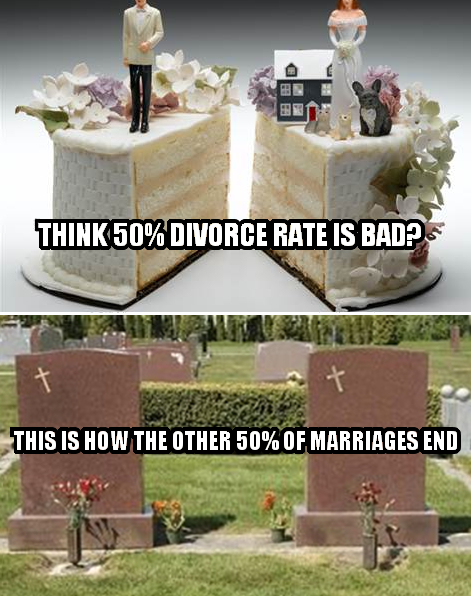
Even if people had more technically “durable” marriages in the past than today, it sure as hell was not because they knew the secret to keeping passionate love alive for all eternity any more than us schmucks of today. It was for two decidedly un-warm-and-fuzzy reasons:
1) people needed to stay bonded for life out of socio-economic necessities and / or
2) marriage was compulsory and divorce was either completely illegal or socially stigmatized to the point where it was not a real option.
So, kiddies, instead of bemoaning the death of Love as we know it, be grateful for the unlimited opportunity to find a new lease on life and fulfillment. High divorce rates are actually a sign that the search for true love is quite alive: people are willing to leave their current partner and upset their established routines, identities and social lives — just to give themselves a chance at finding “the right one”, the fools.
Pretty romantic, no?
MYTH #1: WHEN *I* WAS YOUNG, THE WORLD WAS A BETTER PLACE
Who, among us, isn’t guilty of strolling down the ole’ memory lane and yearning for the magic of childhood? This tendency is so strong in humans that we start mourning the passing of our youth, while still in it.
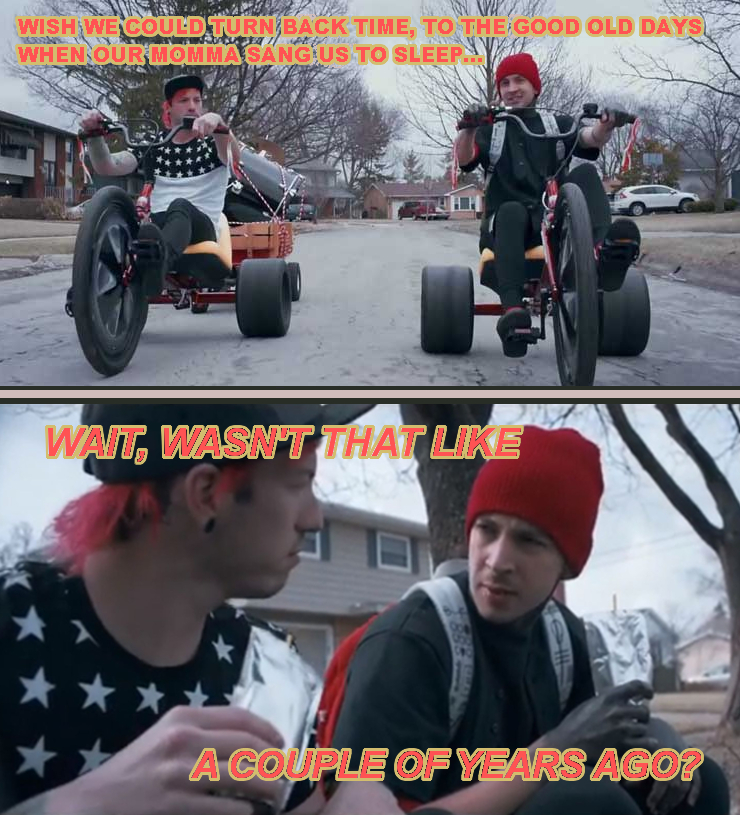
Go ahead, indulge in nostalgia — just don’t confuse the deeply personal experience of being a child with the historical time period that coincided with it.
Listening to some folks talk, they seem to genuinely believe that “back then”, life was objectively more exciting and full of opportunities, and that food tasted better and the air smelled fresher. Suuuure — and people and objects were much larger and distances were farther apart too 😆
In fact, the world had been aflame all along. It is just that your young brain was, first, too underdeveloped, sheltered and naive and, later, too drunk, high, horny and generally overstimulated to pick up on all the misery and atrocity surrounding you. If obliviousness shielded us from reality, all children and drunks would be immortal.
The truth is, the world of our youth was full of sudden possibilities because WE were full of untapped potential and it still remained to be seen what we would do with all those natural gifts. Then, somehow, you find yourself a grownup — with a hefty baggage of rejections, betrayals and losses and the lingering aftertaste of humble pie on your breath. Whether or not you are doing “well” for yourself, by a certain age you realize that adulthood is not the smooth ride of wish fulfillment you once imagined.
So, of course, it’s nice to long for the “good old days” of boundless energy, trust, the delight of having so much to discover in the world. Underneath it all, we all long to be a clean slate, free from responsibility and unburdened by disappointment — in essence, to be an innocent baby again. Our mouths are grumbling “back in my day” but our brains are sputtering “goo-goo, gaa-gaa”.
Buck up disgruntled Gen-X-ers and jaded Millennials! There’s a “teaching moment” and a self-bettering opportunity in all this infantile snot-wallowing. Next time you get the urge to miss them “good old days”, ask yourself: how do I feel about my life today? What is so unsatisfactory / disillusioning about my present that I’m willing to invent a fake past to distract myself from it?
The good news is that there is plenty of wonder and magic and “good” left in the world for all of us to tap — it just has to be accessed from the advanced spiritual plane of gratitude and empathy, afforded by experience accumulated through life. The less-good news is that, while aging bears much fruit in the way of anxiety and cynicism, it in no way guarantees maturity or wisdom, so… Good luck with that, let me know how it works out for you — and I’ll do the same…
[1] For a detailed history and analysis, check out Steven Pinker’s “The Better Angels of Our Nature: Why Violence Has Declined.” (Public Library)





